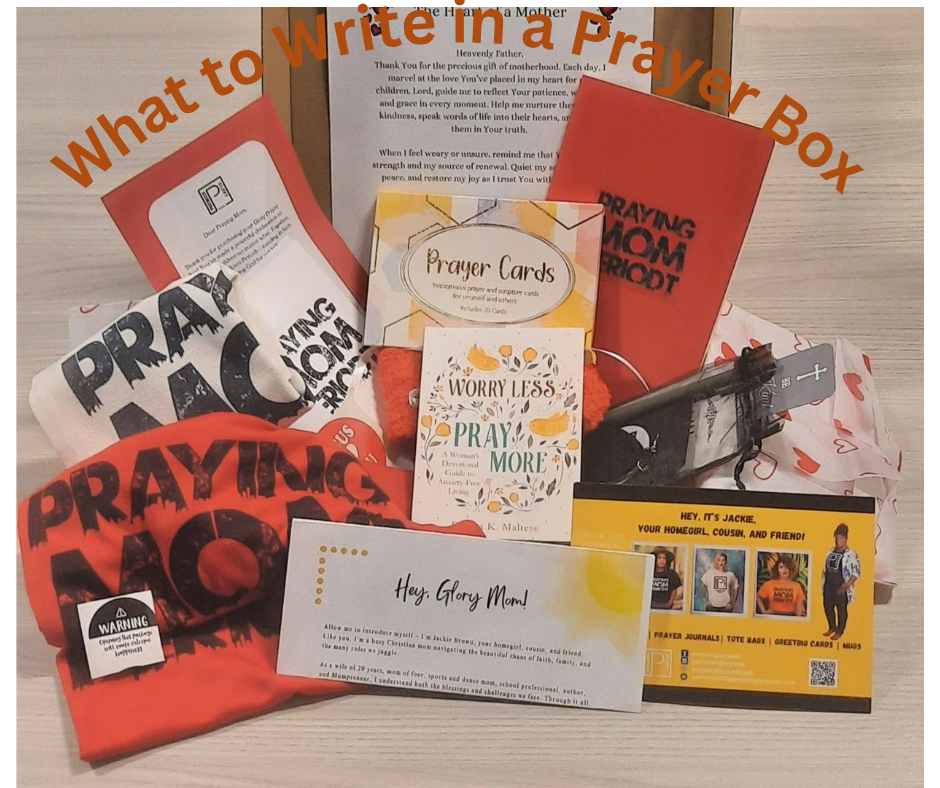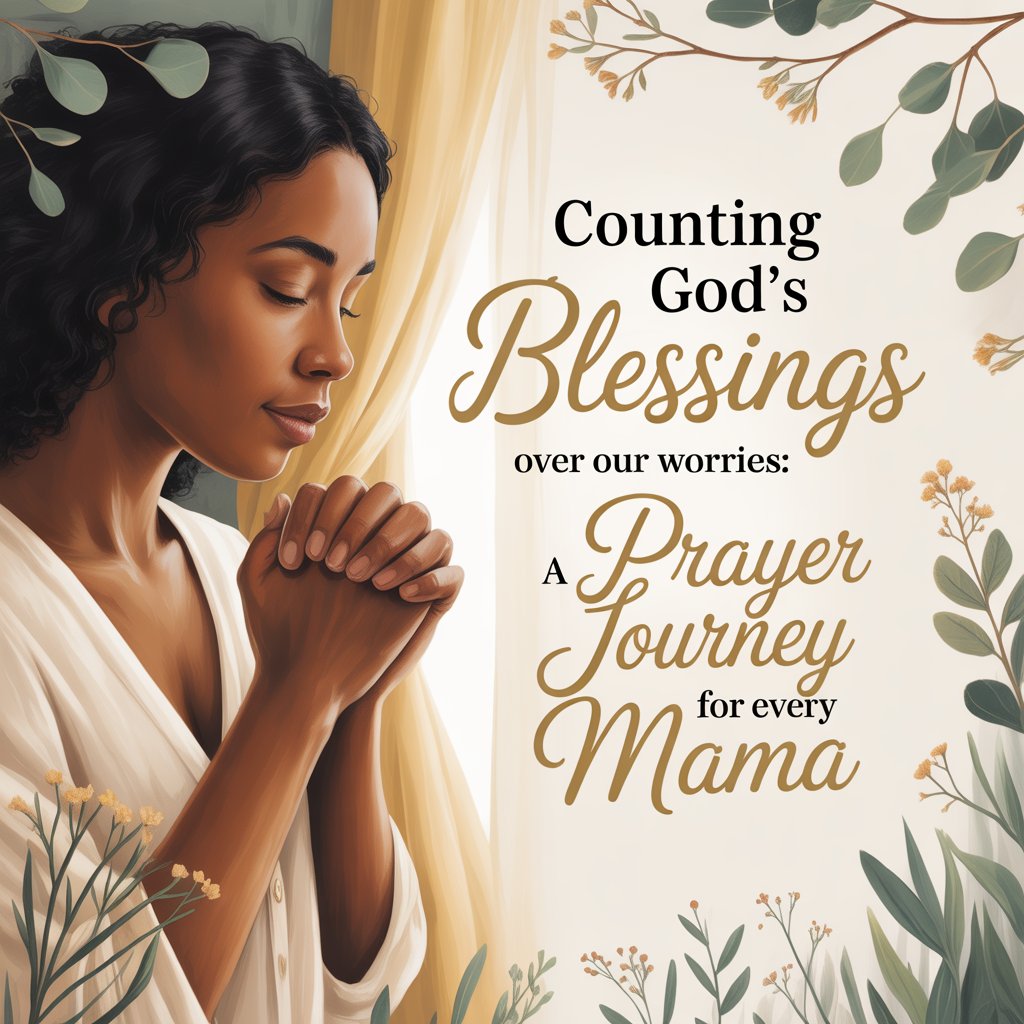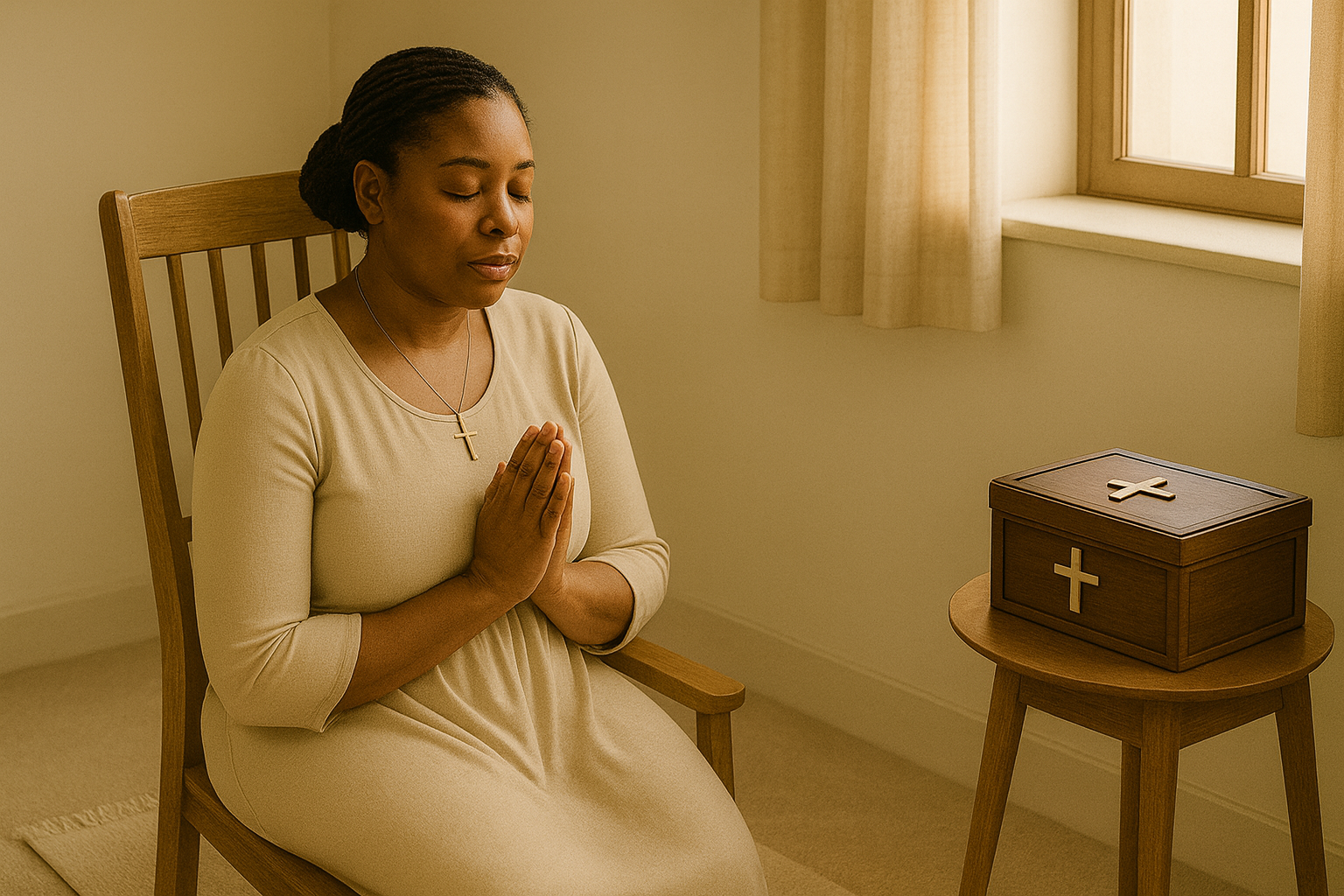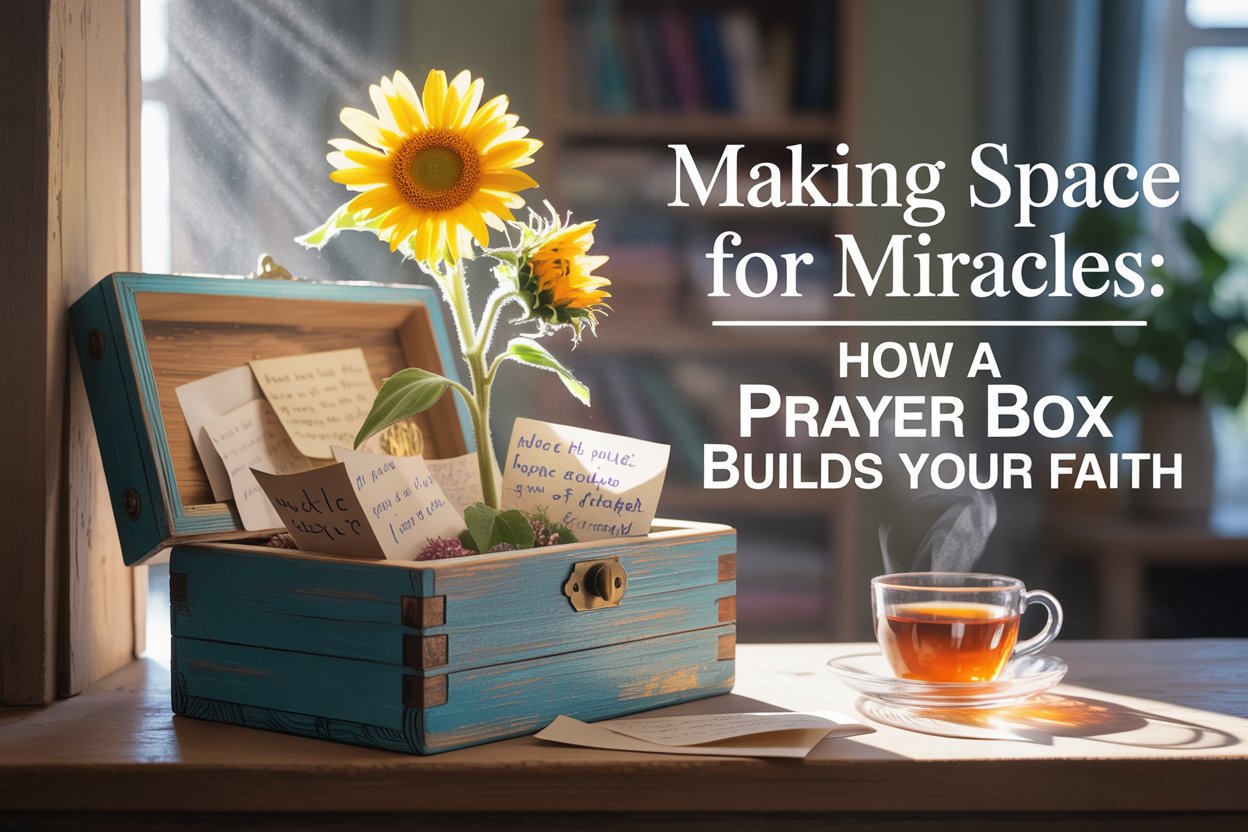What to Write in a Prayer Box: Simple Ideas to Grow Your Faith

Have you ever wanted to pray more but didn't know where to start? Maybe you've felt that tug in your heart to connect more deeply with God, but when you finally find a quiet moment, your mind goes blank or gets overwhelmed by all the things you could or should be praying about. You're definitely not alone in this struggle - many Christian women find themselves wanting a richer prayer life but feeling uncertain about how to make that happen practically.
Writing your prayers in a prayer box can make it all easy. A prayer box is a beautifully simple solution to this common challenge. It's essentially a personal, sacred space where you place your written prayers, worries, gratitudes, and spiritual reflections before God. Think of it as a physical representation of bringing your concerns to the Lord and leaving them in His capable hands. The practice of writing prayers and placing them in a designated space creates a tangible way to release burdens while building a record of your ongoing conversation with God.
If you're reading this and thinking, "That sounds wonderful, but I have no idea what I would actually write in a prayer box," don't worry at all. This post is here to give you simple, practical ideas that will help you get started and develop a meaningful prayer writing practice that fits your real life and spiritual needs.
Why Writing Down Your Prayers Matters
Let's be honest about something: life gets incredibly loud. Between kids calling for you, work deadlines demanding attention, household responsibilities never ending, and the constant stream of information from phones and media, it can feel nearly impossible to quiet your mind enough for meaningful prayer. Our thoughts jump from grocery lists to work stress to parenting concerns to family relationships, and before we know it, any attempt at focused prayer has been hijacked by mental to-do lists.
Writing prayers helps quiet this internal noise and creates space for genuine connection with God. When you write, you're forced to slow down, choose words intentionally, and focus your thoughts in ways that spoken prayer sometimes can't achieve. The physical act of writing engages different parts of your brain and can help you stay present and focused during prayer time.
Creating a Spiritual Record
One of the most faith-building aspects of written prayer is how it creates a record of your relationship with God over time. When you write prayers consistently, you begin to notice patterns - both in what you're praying about and in how God responds. You might discover that concerns you were wrestling with months ago have been resolved in ways you never expected, or that prayers you'd forgotten about have been answered in beautiful, surprising ways.
This documentation becomes especially powerful during seasons of doubt or difficulty. When you're struggling to see God's goodness or questioning whether He really hears your prayers, you can return to your written record and see concrete evidence of His faithfulness. Reading old prayers and noting answered requests builds confidence in God's character and reminds you that He's always working, even when you can't see it in the moment.
Emotional and Mental Benefits
The practice of writing prayers also provides significant emotional and mental health benefits. When you're carrying heavy burdens - whether it's worry about your children, stress about finances, grief over loss, or anxiety about the future - writing those concerns down and symbolically placing them in God's hands can provide immediate relief.
This practice helps prevent the endless mental cycling that can happen when we carry concerns alone. Instead of thoughts spinning repeatedly in your head, they have a destination and purpose. You've acknowledged them, brought them to God, and created space for peace to enter your heart and mind.
It's Okay to Be Imperfect
One important thing to remember as you begin writing prayers is that God cares infinitely more about your heart than about perfect words or beautiful handwriting. Your prayers don't need to sound like they came from a devotional book or seminary professor. They can be messy, honest, confused, grateful, angry, hopeful, or any combination of emotions you're experiencing.
God already knows what's in your heart before you write a single word. The practice of writing isn't to inform Him of something He doesn't know - it's to help you process your thoughts and emotions while creating space for Him to speak into your circumstances. Don't let perfectionism prevent you from experiencing the peace and connection that comes from written prayer.
Simple Things You Can Write in Your Prayer Box

Now let's get practical. If you're staring at a blank piece of paper wondering what to write, here are simple, heartfelt categories and examples that can help you get started. Remember, these are just suggestions - your prayers should reflect your unique heart, circumstances, and relationship with God.
Personal Prayers
Personal prayers are the intimate conversations between you and God about your daily life, character growth, and spiritual needs. These prayers often focus on asking for God's help, guidance, or strength in specific areas of your life.
Examples of personal prayers:
-
"Lord, help me stay patient today, especially during the after-school homework battle."
-
"Please give me wisdom in how to respond to my teenager's attitude."
-
"God, I'm feeling overwhelmed by everything on my plate. Help me prioritize what matters most."
-
"Help me find joy in the ordinary moments instead of always rushing to the next thing."
-
"Lord, I've been struggling with comparison lately. Remind me of my worth in Your eyes."
-
"Please give me energy for today - I'm running on empty but my family needs me."
-
"Help me be a better friend to Sarah. Show me how to encourage her during this difficult time."
-
"God, I'm scared about this medical test. Please calm my anxiety and help me trust Your plan."
Personal prayers can be as specific or general as feels natural to you. Some days you might write detailed prayers about specific situations, while other days you might simply write, "Help me trust You today" and that's perfectly meaningful.
Prayers for Others
Intercessory prayer - praying for others - is one of the most loving things we can do. When you write prayers for family members, friends, and even strangers, you're participating in God's work in their lives and demonstrating love in a powerful way.
Family prayers:
-
"Lord, protect my children's hearts and minds as they navigate friendships at school."
-
"Help my husband feel appreciated and valued, especially during this stressful season at work."
-
"Please give my aging parents good health and peace about the future."
-
"God, guide my college-aged son as he makes important decisions about his future."
-
"Help our family grow closer to You and to each other."
Friends and community prayers:
-
"Lord, be with Jenny as she goes through her divorce. Give her strength and surround her with support."
-
"Please heal Mark's father and give their family peace during this scary time."
-
"Help our church find the right pastor to lead us forward."
-
"God, I pray for my neighbor who doesn't know You yet. Open her heart to Your love."
Prayers for your children's future:
-
"Lord, help my daughter choose friends who will encourage her faith."
-
"Please guide my son toward a career that uses his gifts and serves others."
-
"God, I pray my children will love You and make wise choices throughout their lives."
-
"Help my kids develop strong character and resilience for whatever challenges they'll face."
Thank You Notes to God
Gratitude prayers are some of the most joy-filled prayers you can write. They train your heart to notice God's goodness in both big and small ways, shifting your focus from what's lacking to what's abundant in your life.
Big thank you:
-
"Thank You for healing my mother after her surgery."
-
"God, I'm so grateful my son got into his first-choice college."
-
"Thank You for providing the job my husband needed exactly when we needed it."
-
"Lord, thank You for restoring my marriage after such a difficult season."
Small but meaningful thank you:
-
"Thank You for my morning coffee and five minutes of quiet before everyone woke up."
-
"God, I'm grateful for my toddler's laugh - it filled my heart today."
-
"Thank You for the beautiful sunset I noticed on my drive home."
-
"Lord, thank You for the encouraging text from my friend exactly when I needed it."
-
"I'm grateful for cozy pajamas and a warm bed after a long day."
Everyday gratitude:
-
"Thank You for my health and the ability to take care of my family."
-
"God, I'm grateful for reliable friends who show up when I need them."
-
"Thank You for Your patience with me when I struggle and doubt."
-
"Lord, I'm thankful for the privilege of being my children's mother."
Favorite Scriptures
Including Bible verses in your prayer box creates a collection of God's truth that you can return to for encouragement, guidance, and comfort. Choose verses that speak to your current season or that have special meaning in your spiritual journey.
Verses for anxious seasons:
-
"Do not be anxious about anything, but in every situation, by prayer and petition, with thanksgiving, present your requests to God." (Philippians 4:6)
-
"Cast all your anxiety on him because he cares for you." (1 Peter 5:7)
Verses for strength:
-
"I can do all this through him who gives me strength." (Philippians 4:13)
-
"The Lord your God is with you, the Mighty Warrior who saves." (Zephaniah 3:17)
Verses for guidance:
-
"Trust in the Lord with all your heart and lean not on your own understanding; in all your ways submit to him, and he will make your paths straight." (Proverbs 3:5-6)
Verses for comfort:
-
"The Lord is close to the brokenhearted and saves those who are crushed in spirit." (Psalm 34:18)
You might write these verses on beautiful cards, copy them in your own handwriting, or include personal notes about why they're meaningful to you.
Faith Goals
Writing spiritual goals helps you be intentional about growing in your relationship with God. These aren't legalistic rules but heartfelt desires to develop habits that draw you closer to Him.
Examples of faith goals:
-
"I want to read my Bible every morning before checking my phone."
-
"I want to start praying before school drop-off instead of rushing out the door."
-
"Lord, help me memorize one new verse each month."
-
"I want to be more intentional about praying with my children at bedtime."
-
"Help me find a way to serve others in our community."
-
"I want to develop the habit of thanking You for three things each day."
-
"God, help me listen better during church instead of letting my mind wander."
-
"I want to be brave enough to share my faith with my coworkers."
Writing these goals in your prayer box makes them feel more sacred and intentional than just thinking about them. You're inviting God into your desire for spiritual growth and asking for His help in developing these habits.
Worries to Release
One of the most therapeutic aspects of prayer box writing is using it to release worries and concerns that you can't control. This practice helps you acknowledge real concerns while actively choosing to trust God with outcomes you can't determine.
Format for releasing prayers:
-
"God, I'm worried about [specific concern], but I can't control this. I'm choosing to trust You with it."
-
"Lord, I'm scared about [situation]. Please take this fear and replace it with Your peace."
-
"I don't understand why [circumstance] is happening, but I believe You're still good and still in control."
Examples of releasing prayers:
-
"God, I'm terrified about my teenager making poor choices, but I can't control her decisions. Help me trust that You love her even more than I do."
-
"Lord, I'm worried about our finances, but I'm choosing to believe You will provide what we need."
-
"I don't know if my marriage will survive this difficult season, but I'm putting it in Your hands."
-
"God, I'm scared about my aging and what that means for my family, but I trust Your plan for my life."
How the Glory Prayer Box Helps You Stay Consistent
This is where Premier Glory Wear's Glory Prayer Box becomes such a beautiful and practical solution for women who want to develop meaningful prayer writing practices but need support and encouragement to stay consistent. The Glory Prayer Box isn't just a collection of spiritual items - it's a complete system designed to make prayer writing more accessible, enjoyable, and sustainable.
Everything You Need in One Beautiful Package
The Glory Prayer Box takes the guesswork out of starting a prayer writing practice by providing everything you need in one carefully curated collection:
Beautiful Prayer Journal - A high-quality journal specifically designed for recording prayers, spiritual insights, and answered prayers. The journal includes gentle prompts and encouragement for women who might feel uncertain about how to begin writing prayers or organizing their spiritual thoughts.
Encouraging Scripture and Affirmation Cards - A collection of carefully selected Bible verses and faith-based affirmations that can be used for daily meditation, encouragement during difficult times, or sharing with others. These cards are perfect for including in your prayer writing practice or for focusing your heart before you begin writing.
Red Fuzzy Socks - These cozy socks might seem like a small detail, but they're actually crucial for creating a peaceful prayer environment. When you put on these soft, comfortable socks, you're creating a ritual that signals to your mind and body that it's time to slow down and focus on spiritual connection.
"Praying Mom Periodt" Tee - This comfortable, stylish shirt serves as both a declaration of identity and a daily reminder of your calling as a praying woman. Wearing it during prayer time can boost confidence and remind you of your spiritual authority and responsibility.
Additional Support Items - The box includes other thoughtful touches like stickers, a special pen, and various items designed to bring warmth and personality to your prayer practice. These details help make prayer time feel special and anticipated rather than like another obligation.
Designed for Real Women's Lives
What makes the Glory Prayer Box particularly valuable is how it acknowledges and works with the realities of women's lives rather than demanding perfect conditions or lengthy time commitments. Every item is chosen with busy women in mind - mothers juggling multiple responsibilities, working women with packed schedules, and anyone who wants to grow spiritually but needs practical support to make that happen.
The flexibility of the items means you can create meaningful prayer experiences whether you have five minutes or fifty available. Some days you might use everything for an extended prayer and reflection session. Other days you might simply put on your cozy socks, grab a scripture card, and write a quick prayer in your journal.
Building Sustainable Habits
The Glory Prayer Box helps you build sustainable prayer writing habits by making the practice more enjoyable and accessible. When you have beautiful, dedicated materials for prayer writing, you're more likely to prioritize and protect that time. The items serve as visual reminders of your commitment to spiritual growth and make it easier to transition from daily activities to focused prayer time.
The collection also provides variety in how you can approach prayer writing, which helps prevent boredom or feeling stuck in rigid routines. You might use different combinations of items on different days, keeping your prayer practice fresh and engaging.
Make It a Sacred Routine
Once you have your prayer box materials and understand what you might write, the next step is developing routines that work with your actual schedule and energy levels. The goal isn't to create another obligation that stresses you out, but to establish gentle rhythms that draw you closer to God consistently.
Morning Prayer Writing
Many women find that morning prayer writing sets a positive tone for their entire day. This might involve:
Early Rising: Wake up 15-20 minutes before everyone else in your household. Put on your cozy socks, make coffee, and settle into your designated prayer space with your journal and scripture cards.
Simple Morning Routine: Read one scripture card to focus your heart, then write briefly about the day ahead - any concerns you want to surrender, people you want to pray for, or gratitude for the new day.
Setting Daily Intentions: Use your prayer writing time to ask God for guidance in prioritizing your day and help with any specific challenges you're anticipating.
Evening Reflection and Release
Evening prayer writing can be a powerful way to process the day and release concerns before sleep:
Daily Download: Write about what happened during the day - both challenges and blessings. This helps you process emotions and experiences while acknowledging God's presence throughout your day.
Gratitude Practice: End each day by writing down three things you're grateful for, no matter how small. This practice trains your heart to notice God's goodness even during difficult seasons.
Worry Release: If you're carrying concerns into the evening, write them down and symbolically place them in your prayer box, choosing to trust God with outcomes you can't control.
Weekly or Seasonal Rhythms
You don't have to write in your prayer box daily for it to be meaningful. Some women prefer weekly or even seasonal rhythms:
Sunday Evening Planning: Use Sunday evenings to write prayers for the week ahead, including specific requests for family members, work challenges, or spiritual goals.
Monthly Reflection: Set aside time each month to review previous prayers, note answered requests, and write about how you've seen God working in your life.
Seasonal Spiritual Checkups: Use different seasons of the year to focus on different types of prayer writing - perhaps gratitude during fall, surrender during winter, growth goals during spring, and celebration during summer.
Remember, the best routine is the one you'll actually maintain. Start small and build gradually rather than creating elaborate plans that become overwhelming.
A Gift of Quiet Strength
The Glory Prayer Box makes an exceptionally meaningful gift because it addresses something many women desperately need but rarely ask for - tools and encouragement for developing a deeper spiritual life. When you give someone a Glory Prayer Box, you're offering much more than beautiful items; you're providing resources for finding peace, growing in faith, and connecting with God more consistently.
Perfect Recipients
Tired Moms who love God but struggle to find time for consistent spiritual practices will treasure having everything they need in one beautiful package. The flexibility of the items means they can connect with God whether they have brief moments or longer periods available.
Women Going Through Hard Seasons need reminders of God's faithfulness and tools for processing their struggles through prayer. The Glory Prayer Box provides both comfort items and practical resources for maintaining faith during challenging times.
New Believers who want to grow spiritually but aren't sure how to develop prayer habits will find gentle guidance and encouragement in the included materials. Everything is designed to be accessible and non-intimidating for women at any stage of spiritual growth.
Yourself if you've been longing for a richer prayer life but haven't known where to start or what tools might help. Sometimes the best gift is giving yourself permission to invest in your spiritual growth with beautiful, meaningful resources.
More Than a Gift - A Faith Investment
When you give or receive a Glory Prayer Box, you're making an investment in spiritual growth that continues to provide value long after it's opened. Every time the recipient uses the journal, reads a scripture card, or puts on the cozy socks for prayer time, they're reminded of your love and support for their spiritual journey.
This ongoing impact makes the Glory Prayer Box different from typical gifts that provide momentary pleasure. It's a tool that keeps blessing and encouraging the recipient as they develop deeper spiritual habits and stronger faith.
The beautiful presentation of the Glory Prayer Box also communicates that spiritual growth is worthy of investment and attention. When someone receives this thoughtfully curated collection, they understand that their relationship with God matters and deserves to be nurtured with intentional care.
Overcoming Common Obstacles
Even with the best intentions and beautiful tools, many women encounter obstacles when trying to develop consistent prayer writing practices. Understanding these common challenges can help you prepare strategies for overcoming them.
"I Don't Know What to Say"
This is probably the most common concern women have about prayer writing. The truth is, God doesn't need eloquent words or perfect theology - He wants honest communication from your heart. Start with simple, conversational language like you're talking to a trusted friend who loves you completely.
If you're truly stuck, begin with gratitude. Write three things you're thankful for, no matter how small. This usually opens the door for other thoughts and prayers to flow naturally.
"I Don't Have Time"
Time constraints are real, especially for busy moms and working women. The solution isn't finding large blocks of time but making prayer writing practices flexible enough to work with your actual schedule.
Even two or three minutes of prayer writing can be meaningful. You might write one sentence of gratitude while your coffee brews, jot down a quick prayer request while waiting in the car line, or write a brief prayer for your children while they're getting ready for bed.
"I'm Not Consistent"
Consistency doesn't mean perfection. If you miss days or even weeks of prayer writing, that doesn't mean you've failed or should give up. Simply return to the practice when you're able, without guilt or self-criticism.
Sometimes life seasons require different levels of spiritual practice. During particularly busy or challenging times, your prayer writing might be less frequent but still meaningful when it happens.
"I Feel Silly Writing to God"
If prayer writing feels awkward at first, that's completely normal. Like any new practice, it takes time to feel natural and comfortable. Remember that God already knows your thoughts before you write them - you're not informing Him of anything He doesn't know.
Focus on the benefits you experience rather than feeling self-conscious about the practice. Most women find that prayer writing brings peace, clarity, and a stronger sense of connection with God, even if it feels strange initially.
Building on Your Prayer Writing Practice
As you develop consistency with basic prayer writing, you might want to expand your practice in ways that bring even greater spiritual growth and connection.
Prayer Walking
Combine prayer writing with prayer walking by taking your small notebook and pen on walks. Stop periodically to write brief prayers about things you see, people you encounter, or thoughts that come to mind during your walk.
Scripture Journaling
Expand your practice by copying Bible verses into your prayer journal and then writing personal responses, questions, or applications. This combines Bible study with prayer writing for deeper spiritual engagement.
Prayer Partnerships
Share your prayer writing practice with trusted friends by exchanging prayer requests, praying for each other's written concerns, or even starting a prayer journal that you pass back and forth.
Family Prayer Integration
Involve your family by having everyone contribute prayer requests to a family prayer box, reading prayers together during family devotions, or teaching children to write their own simple prayers.
Conclusion
As we conclude this exploration of what to write in a prayer box, I want to remind you of something beautiful and important: whatever you write in your prayer box, remember that God hears every word. He's not looking for perfect grammar, theological accuracy, or eloquent phrases. He's looking for honest hearts and willing spirits.
Your prayers don't have to be long to be meaningful. They don't have to be profound to be powerful. They don't have to be consistent to be valuable. God meets you exactly where you are, with whatever you're able to offer, whenever you're able to offer it. Start where you are, with what you have, and trust God to meet you in that simple beginning place.





